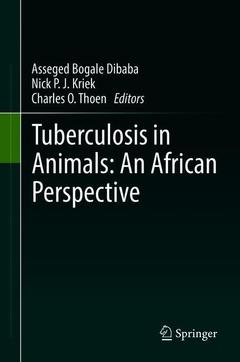Tuberculosis in Animals: An African Perspective, 1st ed. 2019
Coordonnateurs : Dibaba Asseged B., Kriek Nicolaas P. J., Thoen Charles O.

This book recounts the biology of M. bovis, followed by the status of bovine Tuberculosis (bTB) in African countries, primarily based on zoonotic and epidemiological field reports. Since the accumulation of data is valueless unless it led to practicable control measures, emphasis is put on locally adapted protocols for future control of the disease. In order to systematically evaluate the knowledge base of bTB, Epidemiologic Problem Oriented Approach (EPOA) methodology was used. The methodology is composed of two triads: i) the problem identification/characterization triad, which is mainly descriptive in nature, and ii) the problem management/solution/mitigation triad, which is mainly geared toward problem management/solution (see figure). The first triad comprises three pillars: i) agent ii) host, and iii) environment and the second one: i) therapeutics/treatment, ii) prevention/control, and iii) health maintenance/promotion. The two triads are linked together by the diagnostic procedure linkage. The systematic and detailed studies of the ?Host-Agent-Environment? interactions are the building blocks to the understanding of agent transmission pathways and disease spread. These may include data about the disease status of the country, the nature of the disease agent and its hosts, the modes of transmission, the wildlife reservoirs in nature, persistence of infection, and agent survival in animal products and the environment. The problem identification and characterization triad identifies these interactions. Once a problem has been identified and well understood, the next step is to minimize the risk of transmission and spread of a disease. This area, referred to as problem solution/management triad, consists of problem management alternatives that rely upon prevention/control, and health maintenance/promotion of the disease in livestock, wildlife, and humans with the emphasis on resource-poor, developing countries in Africa.
Prof. Asseged Bogale Dibaba
Center for Computational Epidemiology, Bioinformatics and Risk Analysis; College of Veterinary Medicine, Nursing and Allied Health; Tuskegee University, Tuskegee, USA.
Professor Dibaba received his Master of Science in epidemiology from Freie Universität Berlin Germany and received his Doctor of Veterinary Medicine from Addis Ababa University, Ethiopia. His research area is computational epidemiologic studies and risk analyses related to the import/export of agricultural products with regard to the introduction of exotic disease agents into the USA. The products in question range from conventional products (e.g., living animals, meat, milk) to non-conventional products (e.g., embryos and embryo-clones).
Another research area is bovine tuberculosis (bTB). The aim of this work is to elucidate the economic and public health significance of bTB and to recommend measures to control the disease, both in human and animal populations.
Prof. Nick P. J. Kriek
Emeritus Professor: Wildlife & Pathology, Faculty of Veterinary Science, University of Pretoria, South Africa
Professor Kriek received his Bachelor of Veterinary Science and M Med Vet (Path) from the University of Pretoria, South Africa and his Doctor of Philosophy from the Medical University of South Africa (MEDUNSA).
He is a specialist pathologist with the emphasis on African wildlife diseases.
Prof. Charles O. Thoen (1936-2017)
College of Veterinary Medicine, Iowa State University, Ames, Iowa, USA
Professor Thoen received his Bachelor of Science in Biology and Doctor of Veterinary Medicine degrees from the University of Minnesota before receiving his Doctor of Philosophy from the Mayo Graduate School of Medicine in Rochester, Minnesota, USA.
His research was mainly focused in the areas of veterinary microbiology and preventive medicine, pathobiology, immunology and preventive medicine. He has authored or co-auth
Deals with the disease status, epidemiologic pattern and zoonotic implications of Bovine Tuberculosis
Combines fragmented evidence on Bovine Tuberculosis in developing countries using Epidemiologic Problem Orientated Approach (EPOA) methodology ?
Emphasis is put on locally adapted protocols for future control of Bovine Tuberculosis
Date de parution : 07-2019
Ouvrage de 453 p.
15.5x23.5 cm
Disponible chez l'éditeur (délai d'approvisionnement : 15 jours).
Prix indicatif 210,99 €
Ajouter au panier